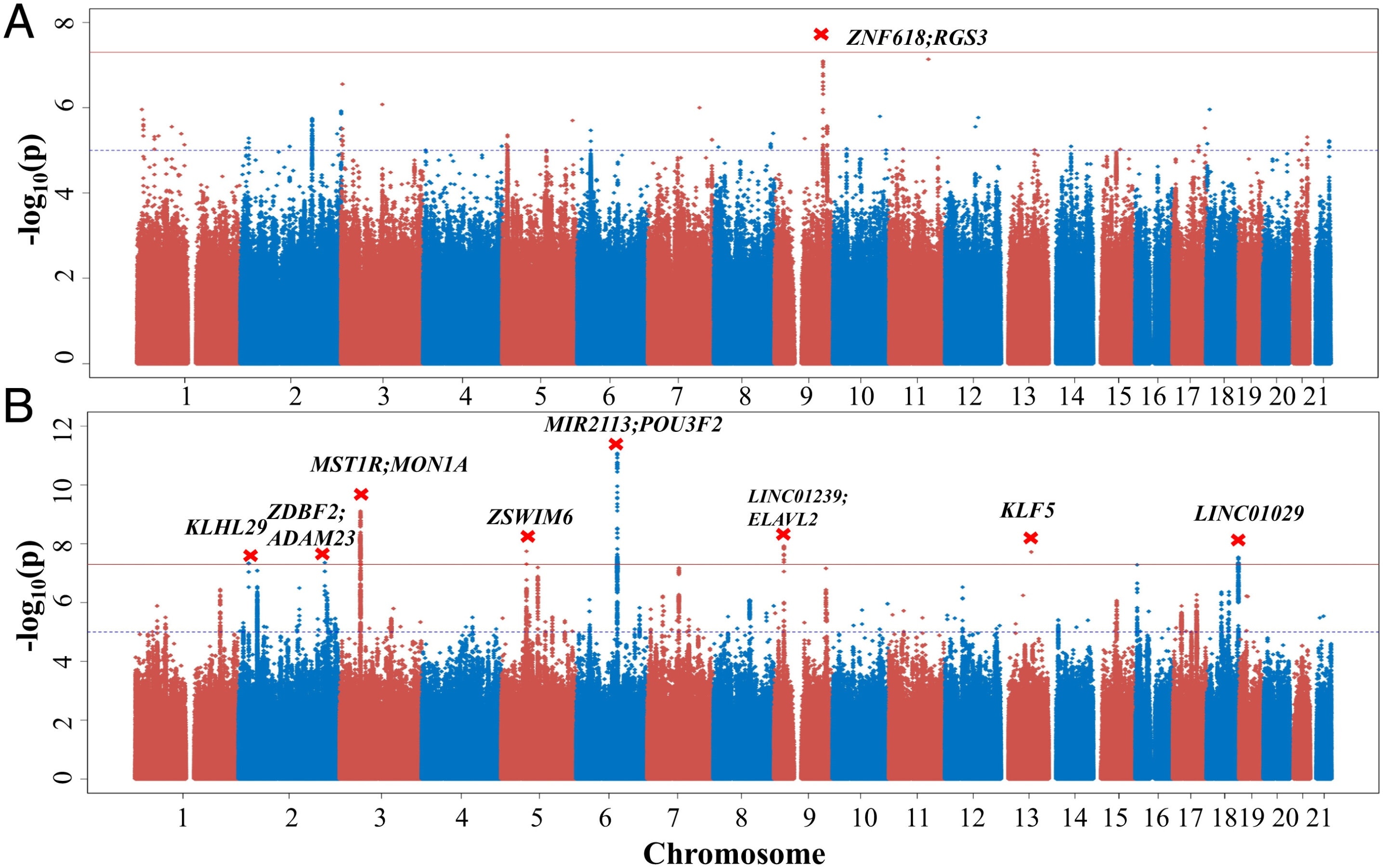The locations of nine core genetic markers related with leadership have been discovered in a recent study led by the National University of Singapore (NUS) Business School. For the very first time, researchers would be able to investigate the genetic links between leadership positions and physical and mental health and well-being, revealing fresh light on occupational health.

Manhattan plot of GWAS analysis for leadership traits in the UKB discovery sample. Results are shown for (A) leadership position (n = 42,998/205,642) and (B) leadership managing demands (n = 219,474). The y-axis represents −log10(P value) for association test with each phenotype, and the x-axis represents genomic position based on human genome build 37. The cross in red represents independent genome-wide significant association signals labeled by names of the genes or nearest genes. The horizontal red line indicates the significance level of P < 5.0 × 10−8. The horizontal blue dashed line indicates the suggestive significance level of P < 1.0 × 10−5. Image Credit: Proceedings of the National Academy of Sciences (2022). DOI: 10.1073/pnas.2114271119
Our research continues the investigation on the biological mechanisms of leadership. “Since the late 1980s, studies on twins have shown that differences in people’s genetic make-up account for 30 per cent of differences in whether they hold leadership roles. Now we have gone a step further in using the whole genome to identify the genetic variants more commonly found in leaders and their connection to the leaders’ well-being.”
Zhaoli Song, Study Lead and Associate Professor, Management and Organization, National University of Singapore
Another co-author of the paper, Assistant Professor Fan Qiao from the Centre for Quantitative Medicine at Duke-NUS Medical School said, “Genomic studies have recently become one of the most important methods in biomedicine, which has led to exciting findings and implications in medicine and healthcare. Our study bridges the human genome, occupation, and well-being. The findings reveal the biological basis of leadership and suggest an underlying link between occupational achievement and well-being.”
Leadership and health
The study investigates whether or not being a leader is beneficial to one’s health.
Positive genetic associations between leadership position and improved well-being and health markers, such as higher perceived well-being, lower stress, and depression, were discovered by the researchers.
Being a leader means having more resources, such as a higher sense of control and a higher salary, that usually are associated with better well-being. Thus, we generally will observe that leaders tend to have a better well-being than non-leaders. However, leaders tend to also experience greater work pressure and chronic stress typically associated with diseases.”
Zhaoli Song, Study Lead Author and Associate Professor, Management and Organization, National University of Singapore
The top genetic mutation linked to leadership is also linked to a higher risk of bipolar disorder, according to the study. “Other studies have reported that those holding leadership positions are more likely to have bipolar disorder, while we are the first to find the genetic evidence of such a relationship,” added Professor Song.
Genetic analysis also indicates associations between leadership position and lower well-being, such as higher body mass index and shortened longevity, after controlling the effect of income. Leading a team is a demanding and stressful job, which has some negative health influences. Using genome studies, we can put aside the health effects that a high income brings and uncover leadership’s hidden side effects on health.”
Zhaoli Song, Study Lead Author and Associate Professor, Management and Organization, National University of Singapore
Researchers from Duke-NUS Medical School and the Chinese University of Hong Kong were part of the team. On March 14, the work was published in Proceedings of the National Academy of Sciences of the United States of America (PNAS).
Researchers gathered genetic and occupational data from over 280,000 people of European ancestry utilizing data from the UK Biobank, the world’s biggest public genetic and health data system, and other groups in the United States.
They also looked for information on leadership responsibilities and demands in the United Kingdom Standard Occupation Classification and the United States Occupational Information Network.
The researchers do not believe that genes are responsible for everything. “On the one hand, it seems difficult to claim that there is ‘the leadership gene(s)’ because leadership is a very complex phenomenon that may be affected by tens of thousands of genes, each of which has a very small effect,” explains Professor Song.
“On the other hand, environmental influences such as family and organizational contexts may mediate or moderate the effects of genes. Both nature and nurture matter for leadership,” Professor Song added.
The type of work one does has a significant impact on one’s well-being. As this study demonstrates, being a leader has a negative impact on one’s health. Those in positions of power must be even more vigilant about keeping a healthy lifestyle.
The next step for the research team is to look at complete genomes in Asian populations.
Source:
Journal reference:
Song, Z., et al. (2022) Genetics, leadership position, and well-being: An investigation with a large-scale GWAS. PNAS. doi.org/10.1073/pnas.2114271119.